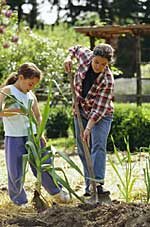Home fertilizer choices
by Philip Dickey, PhD
This article was originally published in March 2003

(March 2003) — Hazardous waste in fertilizer is an important issue and one that needs to be better addressed by federal and state agencies. For the home gardener, however, choosing fertilizers on the basis of their metal content alone can lead to poor product choices; some of the products with the lowest metal levels are some of the least appropriate for lawns and gardens. What’s a gardener to do?
First, build good soil. This does not mean simply adding fertilizer to poor soil. Compost is the best general soil conditioner and almost all landscapes will benefit from regular applications of compost. Compost provides soil structure and beneficial organisms in addition to some nutrients.
Make your own compost if you can and supplement with commercial compost as needed. Compost can be mixed in or applied to the surface as mulch, but a combination of both is usually best. Most compost is low in metals, but compost made from urban yard waste can have somewhat elevated lead levels. Urban soils, however, can have similar or even much higher lead levels. Compost can help to bind up this lead and make it less available to plants.
Recently, some commercial composts were found to be contaminated with an herbicide called clopyralid that could damage some sensitive plants. Last year, the state Department of Agriculture instituted use restrictions on the pesticide that should keep it out of most compost, although some manure products could still be contaminated. Consumers should be able to buy commercial compost with confidence now, but if you’re concerned, ask your compost supplier about their testing procedures. For more information on the clopyralid problem, go to www.cityofseattle.net/util/clopyralid/.
Next, assess your needs for fertilizer. If you have a new garden or landscape, get a soil test to measure nutrient levels. Some plants, such as native plants and many trees, should not need added fertilizer. Most perennials and garden vegetables will benefit from some fertilizer. A good, general purpose, organic 5-5-5 fertilizer will work well for gardens, applied according to labeled rates. Organic or other slow-release fertilizers are preferred because they are least likely to cause water pollution.
If you want to know the metals content of any fertilizer registered in Washington, go to the Department of Agriculture’s fertilizer database on the Internet at www.wa.gov/agr/PestFert/Fertilizers/ProductDatabase.htm. A good rule of thumb is that fertilizers shouldn’t have more metals than the soil on which they will be applied.
Now, let’s look at lawns. Lawn fertilizers are applied in the largest amounts, so product choice is important. Choose an organic or slow-release fertilizer, as indicated on the label by a high percentage of slow-release (water insoluble) nitrogen. A 3-1-2 (or multiple such as 6-2-4) analysis is generally recommended for our region. Stay away from highly soluble “quick greening” fertilizers.
Above all, avoid “weed and feed” products that contain weed killers such as 2,4-D, a ubiquitous water pollutant in local streams. Leave grass clippings on the lawn to provide nutrients and reduce the need for fertilizer.
Compost is an organic soil amendment, but would not meet the requirements for the “approved list” if it contained measurable levels of clopyralid contamination. Any compost product that is on the “approved” list should be free of detectable clopyralid residues. Be aware that some rock phosphate products are high in cadmium.
If you have questions about a product, contact the company directly. For more information, see the Washington Toxics Coalition’s Web site www.watoxics.org for a fact sheet on fertilizer or more information on metals and fertilizers.
